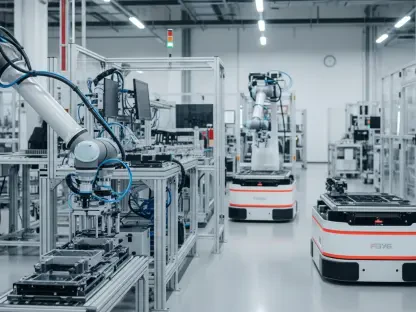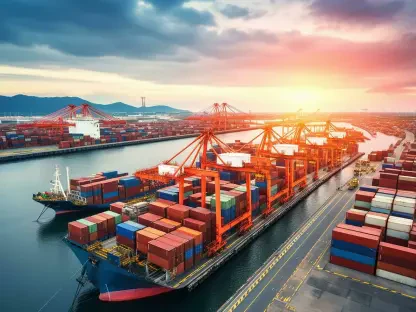The logistics industry is undergoing a significant transformation, thanks to the integration of Artificial Intelligence (AI). Gone are the days of manual processing and guesswork. Today, logistics companies are harnessing AI technologies to streamline operations, optimize supply chains, and enhance customer satisfaction. This article explores how AI is redefining the logistics landscape, enabling businesses to adapt to evolving market demands more effectively.
Current Uses of AI in Logistics
AI has permeated various logistics operations, from warehouse management and supply chain optimization to inventory management. Within warehouses, AI enhances efficiency in picking, packing, and sorting processes through automation. These technologies help make logistics faster and more accurate, reducing human errors significantly. For instance, AI-powered robots can now navigate intricate warehouse layouts with unprecedented precision, picking items from shelves and packing them for shipping with minimal human intervention. This automation not only accelerates the process but also frees up human workers to focus on more complex and strategic tasks.
Another vital application of AI lies in route planning and demand forecasting. AI-powered platforms enable logistics companies to plan the most efficient routes and forecast customer demand accurately. These capabilities lead to substantial cost savings and increased operational efficiency, which are crucial in an industry where margins are often razor-thin. Additionally, AI algorithms can analyze historical data to predict future demand trends, allowing companies to adjust their supply chains proactively. This ability to foresee and react to market changes can make the difference between profit and loss in a highly competitive logistics landscape.
Benefits of AI in Logistics
One of the primary benefits of AI in logistics is supply chain optimization. AI technologies provide robust data insights and analytics, enabling operators to make better-informed decisions. This leads to improved demand planning and resource utilization, reducing the likelihood of overstocking or stockouts. For example, AI can analyze market trends, weather conditions, and consumer behavior to optimize inventory levels, ensuring that goods are always available when needed but without the cost of holding excess inventory. This level of precision in supply chain management was unimaginable just a few years ago.
Workforce planning also sees a transformation with AI. By automating repetitive tasks, AI reduces labor costs and frees up skilled workers for more strategic roles. This not only cuts operational costs but also improves overall efficiency. Additionally, AI enhances customer satisfaction by optimizing logistics routes and managing inventory placement, ensuring timely and accurate deliveries. Predictive analytics powered by AI can foresee potential delivery delays and suggest alternative routes in real-time, thereby minimizing disruptions. These advancements significantly enhance the customer experience, making it more likely for consumers to remain loyal to a brand.
Challenges in Implementing AI in Logistics
Despite its numerous advantages, implementing AI in logistics is fraught with challenges. High costs associated with deploying AI-based systems can be prohibitively expensive for smaller companies. These costs include investments in IT infrastructure, specialized software, and advanced technologies. Moreover, the return on investment (ROI) from AI systems can take years to materialize, making it a riskier venture for businesses operating on thin margins. This financial barrier often delays or even deters companies from adopting AI technologies in their logistics operations.
Another significant challenge is the need for a skilled workforce. Implementing AI requires personnel well-versed in technical skills and AI technologies, a resource that is often hard to find. According to industry surveys, the shortage of qualified AI professionals is one of the most significant bottlenecks in deploying AI systems. Furthermore, ongoing training and development are essential to keep up with the rapid advancements in AI technology, adding another layer of complexity and cost to the implementation process.
System integration poses its own set of difficulties. Many logistics companies rely on legacy systems not designed to seamlessly integrate with modern AI-powered solutions. Integrating these outdated systems with new AI technologies is often complex and time-consuming. This process demands substantial resources and expertise, making it a daunting task for many organizations. Additionally, the integration phase can disrupt ongoing operations, leading to potential losses and inefficiencies during the transition period.
Privacy and security concerns also loom large. The handling of sensitive data by AI systems can pose significant risks, making companies cautious and often delaying the adoption of these technologies. Data breaches or misuse of information can have severe repercussions, including financial losses and damage to a company’s reputation. Therefore, ensuring robust data security measures and adhering to stringent regulatory requirements is imperative but adds another layer of complexity to the implementation of AI in logistics.
Future Applications of AI in Logistics
Looking forward, the future of AI in logistics holds incredible promise. AI technologies are expected to drive supply chain automation further, contributing to greater operational efficiency and cost reduction. Innovations in container shipping and fulfillment operations could improve efficiency, reduce emissions, and elevate customer satisfaction. For instance, AI-driven predictive maintenance can ensure that shipping containers and vehicles are serviced before they break down, thereby reducing downtime and increasing the overall efficiency of logistics networks.
The use of drones and automated vehicles for last-mile delivery is anticipated to revolutionize the logistics sector. These advancements promise to drastically reduce delivery times and enhance operational efficiency, thus offering faster and more reliable shipping options to customers. Fully automated warehouses, equipped with AI-driven sorting and packing machines, could work in tandem with drone delivery systems to ensure that products reach consumers in record time. This could redefine consumer expectations around delivery speed and reliability.
Advanced route planning is another area expected to see significant evolution. AI-powered tools will provide logistics companies with enhanced capabilities to optimize delivery processes, making decisions about the most efficient routes more informed and nuanced. Future AI systems may leverage real-time data from a multitude of sources, including traffic reports, weather conditions, and social media updates, to dynamically adjust delivery routes. This could significantly reduce fuel consumption and improve delivery times, making logistics operations more sustainable and cost-effective.
Generative AI is poised to transform warehouse management. By offering predictive analytics and real-time capabilities, it will facilitate better decision-making processes, making warehouse operations seamless and more efficient. These advanced systems can anticipate future needs and automatically adjust stock levels, workforce allocations, and even robotic workflows, ensuring that warehouses operate at peak efficiency. The integration of AI in warehouse management could also improve safety standards by predicting potential hazards and suggesting preventive measures.
AI’s Impact on Logistics Over the Next Decade
Over the next decade, AI is poised to bring about substantial changes in logistics. Enhanced supply chain operations through real-time analytics and predictive insights will help optimize processes, reduce costs, and improve customer satisfaction. AI systems will become increasingly adept at identifying patterns and anomalies in vast datasets, allowing logistics companies to make proactive adjustments rather than reactive changes. This shift from reactive to proactive management will be a game-changer, enabling companies to stay ahead of potential disruptions and maintain smoother operations.
AI’s role in strategic sourcing and workforce planning will enable logistics companies to manage resources more effectively. This ability will help address supply chain shortages more efficiently, ensuring that businesses can meet market demands without significant disruptions. By predicting market trends and consumer behavior, AI can guide companies in making better sourcing decisions, thereby reducing the risk of supply chain bottlenecks. Additionally, AI-driven workforce planning tools can allocate human resources more effectively, ensuring that labor shortages do not hamper operations.
AI-based solutions will empower logistics companies to make more data-driven decisions and improve strategic planning. This will lead to more connected and efficient global supply chains, capable of adapting to market dynamics smoothly. Predictive models can help companies anticipate future demands, allowing for better production planning and inventory management. This level of foresight can enable businesses to scale operations up or down in response to market conditions, reducing waste and improving profitability.
Advanced AI-driven supply chain tracking systems will enhance visibility, allowing companies to respond to potential disruptions in real-time. This ability to act quickly will be invaluable in maintaining smooth operations and meeting customer expectations consistently. For example, AI can detect disruptions such as delays at customs or weather-related issues and recommend alternative routes or solutions. This real-time adaptability can significantly reduce the impact of unforeseen events, ensuring that goods reach their destinations on time.
Conclusion
The logistics industry is experiencing a remarkable shift due to the incorporation of Artificial Intelligence (AI). The era of manual processing and guesswork is becoming a thing of the past. Nowadays, logistics companies are leveraging AI technologies to streamline their operations, optimize supply chains, and boost customer satisfaction. AI’s integration into logistics allows businesses to manage their workflows more efficiently, reducing human error and improving accuracy.
AI helps logistics firms predict demand more precisely, enabling better inventory management. It also facilitates real-time tracking of shipments, which enhances transparency and builds customer trust. By using AI-powered route optimization, companies can save on fuel costs and ensure timely deliveries, which results in happier customers.
Moreover, AI assists in automating routine tasks, freeing up human resources to focus on more strategic aspects of operations. For instance, chatbots driven by AI can handle customer inquiries, providing quick and accurate responses while human employees can work on complex issues.
This transformation powered by AI is not just about improving individual processes but creating a more integrated logistics network. It enables businesses to respond to evolving market demands more swiftly and effectively, ensuring they stay competitive in a fast-paced environment. The future of logistics, enhanced by AI, promises greater efficiency, reliability, and customer satisfaction.









